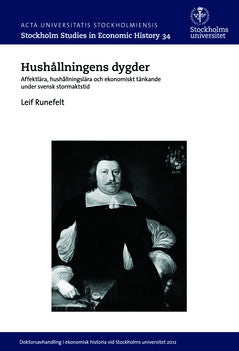
Artikeln har lagts till i varukorgen
Stockholm University
Ny bok | Häftad
Läs mer om olika typer av bindningar här.
LEVERANS: Skickas inom 6-14 vardagar.
LEVERANS: Vi skickar din beställning med Postnords Varubrev eller DHL Servicepoint.
Du betalar alltid endast 49 kr i fraktavgift inom Sverige, oavsett vikt eller antal böcker vid beställning av antikvariska och nya böcker från oss! Läs mer
Det gick inte att ladda hämtningstillgänglighet
En julklapp? Beställ dina julklappsböcker i tid! Var vänlig och lägg märke till leveranstiden nedan. Och oavsett angiven leveranstid, på grund av osäkerhet i leveranser inför jul, rekommenderar vi att du lägger din beställning senast 10 december.
ENDAST 49 kr i fraktavgift inom Sverige, oavsett antal böcker!
Du betalar alltid endast 49 kr i fraktavgift inom Sverige, oavsett vikt eller antal böcker vid beställning av antikvariska och nya böcker från oss! Läs mer
ÅNGERRÄTT inom 14 dagar efter leverans.
RETUR & ÅNGERRÄTT: Du har alltid 14 dagars ångerrätt oavsett anledning, från den dagen du tar emot din leverans.
Skulle vår beskrivning av skicket på boken misstämma eller om vi på annat sätt gjort fel, står vi självfallet för returfrakten.
I KORTHET: Utforska svensk ekonomi från 1600-talet och dess människosyn. Förstå hur etik och samhälle formar ekonomiska teorier.
Hushållningens dygder ger insikter i svensk ekonomisk och etisk tanke under stormaktstiden. Du får förståelse för hur människosyn formar ekonomiska teorier. En viktig läsning för den som vill förstå kulturens påverkan på ekonomiskt tänkande.
A basic assumption in the thesis is that every economic as well as political and ethical doctrine contains a conception of man, and, thus, that this conception needs to be scrutinised in order to achieve deeper understanding of the doctrine. The purposes of the thesis is (1) to account for conceptions of man within the rarely studied Swedish seventeenth-century economic thought, (2) to examine how conceptions of man and of society influence and shape this thought, and (3) to do this from a synchronous approach, by which emphasis is laid on economic thought as an integral part of the intellectual culture of the epoch. In chapter 2 is explored the conception of man as expressed in economic thought. Man is conceived as selfish and irrational. In chapter 3, this conception is explained as it is placed within a wider context, the most common psychological theory of the epoch, the theory of the passions, which is thoroughly examined. Chapter 4 consists of an analysis of the theory of householding, as it was expressed in the literature of the epoch. It is shown that this theory, not focused on by earlier research, to a large extent is a part of ethics and a prolongation of the theory of passions. The householder or "house-father" is obliged to control his own as well as the other household-member's passions, and to maintain the hierarchical order within the household. Chapters 5 to 8 deal with the central areas within economic thought. These areas are domestic production and trade (ch. 5), the sumptuary laws and attitudes towards luxury (ch. 6), the use of the concept of free trade (ch. 7) and the issues of idleness and employment (ch. 8). It is shown that the king or government is viewed as the "house-father" of the realm, and that the core of the theory of the passions, the taming of the passions through reason and virtue, is vital also within economic thought, in which four virtues were central: justice, diligence, temperance and frugality; the same virtues as in the theory of householding.
Bindning: Häftad. 8:o (165x242 mm)År: Utg. 2015. Omfång: 300 s. ISBN: 9789176098615. Språk: Svenska
Författare: Runefelt, Leif
Titel: Hushållningens dygder
Undertitel: Affektlära, hushållningslära och ekonomiskt tänkande under svensk stormaktstid
Förlag: Stockholm University
Genre: Historia och arkeologi
Artikelnr: 518518
Hushållningens dygder av Leif Runefelt hittar du under genren Ekonomisk historia inom Ekonomi, finansväsen, näringsliv & management i kategorin Humaniora. Hitta fler liknande böcker:
Hitta fler liknande böcker med dessa ämnesord:
